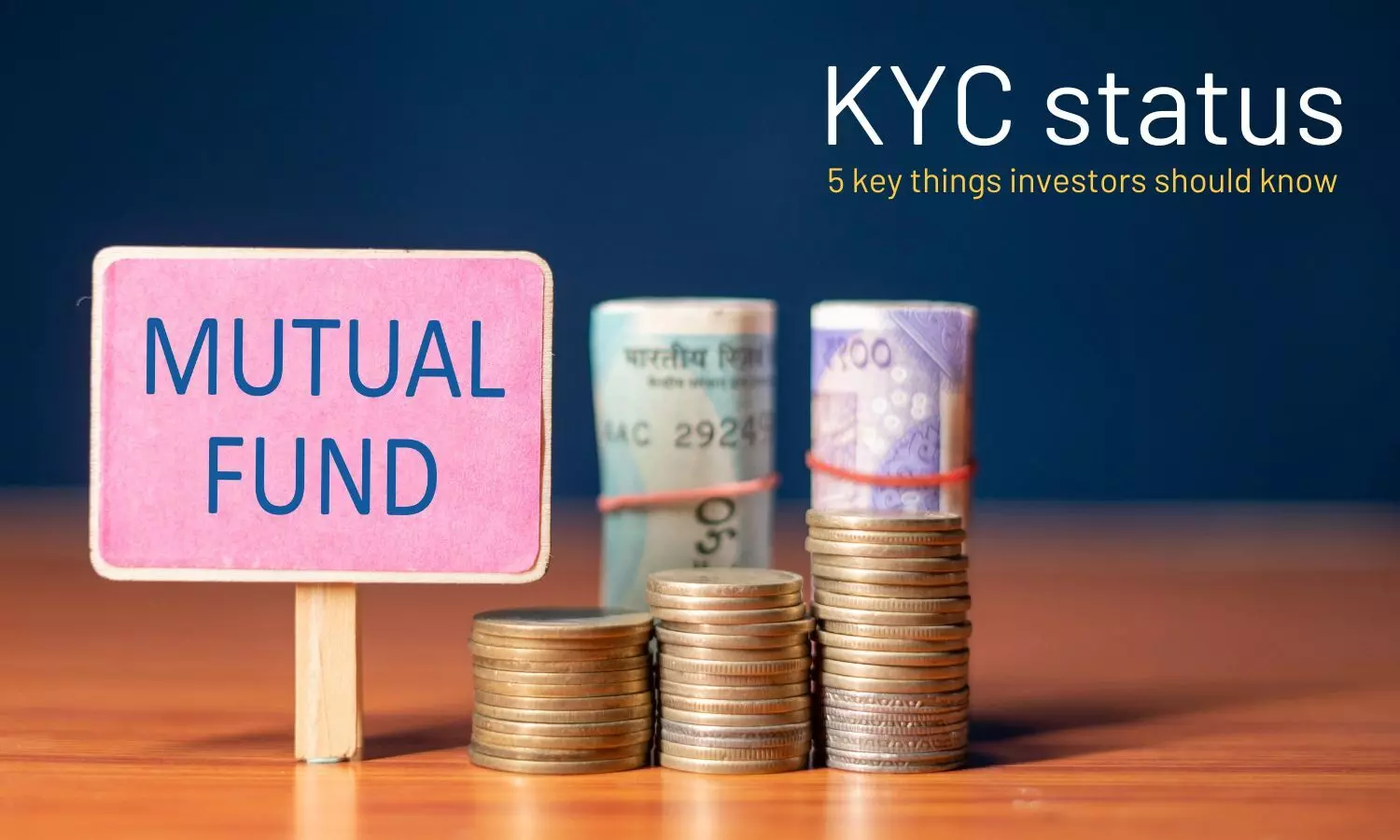Understanding and managing KYC status for mutual fund investments
Learn about the importance of KYC status in mutual fund transactions
image for illustrative purpose

Mutual funds offer a versatile investment avenue, but understanding and maintaining proper Know Your Customer (KYC) status is crucial for smooth transactions. KYC is a process mandated by financial regulators to verify the identity of investors. It helps prevent fraud and ensures compliance with financial regulations.
Here’s an in-depth look at KYC status and what investors should be aware of.
What is KYC Status?
When you invest in mutual funds, your KYC status determines whether you can carry out transactions smoothly. The KYC status can typically be categorised into three types: Validated, Registered, and On-Hold/Rejected. Each of these statuses has different implications for your investment activities.
How to Check Your KYC Status?
To ensure that your KYC is in order, follow these steps:
- Visit the Mutual Fund or RTA Website: You can check your KYC status on the official website of the mutual fund house or the Registrar and Transfer Agent (RTA).
- Find the KYC Status Link: Look for the link or section dedicated to KYC status. It may be listed under investor services or similar headings.
- Enter Your PAN Number: Input your 10-digit Permanent Account Number (PAN) in the designated field.
- View Your KYC Status: The system will display your KYC status as either Validated, Registered, On-Hold, or Rejected.
KYC Status Explained
- KYC Validated: If your KYC status is "Validated," your identity has been fully verified. You can transact freely across mutual funds without needing to update your KYC information. This status indicates that all required documents and verifications are complete, so you can comfortably make purchases, redemptions, or switches in your mutual fund investments.
- KYC Registered: A "Registered" status means that your KYC details are recorded but not yet fully validated. You can still make transactions such as purchases, redemptions, and switches, but if you plan to invest in new mutual funds where you haven't invested before, you'll need to complete the KYC process again. To update your status to "Validated," you can follow the KYC modification process using PAN and Aadhaar, either through XML, Digi-locker, or m-Aadhaar.
- KYC On-Hold/Rejected: If your KYC status is "On-Hold" or "Rejected," it indicates issues with your KYC submission. Common reasons include unvalidated contact details, PAN not linked with Aadhaar, or deficiencies in the submitted documents. To resolve this, address the specific reasons for the hold or rejection by following the instructions provided on the mutual fund’s or RTA’s website. Once these issues are corrected and your status is updated to "Registered" or "Validated," you will be able to resume transactions.
Steps to Rectify KYC Issues
- Identify the Issue: Determine why your KYC status is On-Hold or Rejected by reviewing the notifications or instructions provided by the mutual fund or RTA.
- Update Your Details: Depending on the issue, you may need to update your mobile number, email ID, or ensure that your PAN is linked with Aadhaar. This can often be done online through the respective mutual fund’s website or RTA.
- Submit the Required Documents: If there are deficiencies in the documents submitted, provide the necessary updates or additional documents as required.
- Contact Support if Needed: If you face difficulties during the resolution process, contact the mutual fund distributor, the mutual fund's office, or the helpline listed on the mutual fund’s website for assistance.
Resources for KYC Modification
For ease of updating or modifying your KYC status, here are direct links to eKYC pages for various mutual fund houses:
- 360 ONE Mutual Fund: KYC Modification
- Aditya Birla Sun Life Mutual Fund: Modify KYC
- Axis Mutual Fund: KYC Page
- Bajaj Finserv Mutual Fund: KYC Validation
- Bandhan Mutual Fund: Modify KYC
- Bank of India Mutual Fund: KYC Validation
- Baroda BNP Paribas Mutual Fund: KYC Page
- Canara Robeco Mutual Fund: eKYC
- DSP AMC: KYC Modification
- Edelweiss Mutual Fund: KYC Guide
- Franklin Templeton Asset Management: KYC Modification
- Groww Mutual Fund: KYC Validation
- HDFC Mutual Fund: KYC Verification
- Helios Mutual Fund: KYC Modification
- HSBC Mutual Fund: KYC Page
- ICICI Prudential Mutual Fund: Update PAN
- Invesco Mutual Fund: eKYC
- ITI Mutual Fund: KYC Login
- JM Financial Mutual Fund: KYC Validation
- Kotak Mahindra Mutual Fund: Modify KYC
- LIC Mutual Fund: KYC Validation
- Mahindra Manulife Mutual Fund: Modify KYC
- Mirae Asset Mutual Fund: KYC Validation
- Motilal Oswal Mutual Fund: KYC Login
- Navi Mutual Fund: KYC Update
- Nippon India Mutual Fund: KYC Modification
- NJ Mutual Fund: KYC Validation
- Old Bridge Mutual Fund: KYC Page
- PGIM India Mutual Fund: KYC Login
- PPFAS Mutual Fund: Re-KYC
- Quant Mutual Fund: KYC Validation
- Quantum Mutual Fund: e-KYC
- Samco Mutual Fund: KYC
- SBI Mutual Fund: Modify KYC
- Shriram Mutual Fund: KYC Update
- Sundaram Mutual Fund: KYC Validation
- Tata Mutual Fund: Modify KYC
- TRUST Mutual Fund: KYC Validation
- Union Mutual Fund: KYC Page
- UTI Mutual Fund: Digital KYC
- WhiteOak Capital Mutual Fund: Modify KYC
These resources can help you navigate the KYC modification process efficiently.
Maintaining a validated KYC status is essential for seamless investment transactions in mutual funds. By regularly checking your KYC status and promptly addressing any issues, you ensure that your investment activities are uninterrupted. If any discrepancies arise, following the outlined steps for rectification will help you resolve them swiftly and keep your investments on track.

